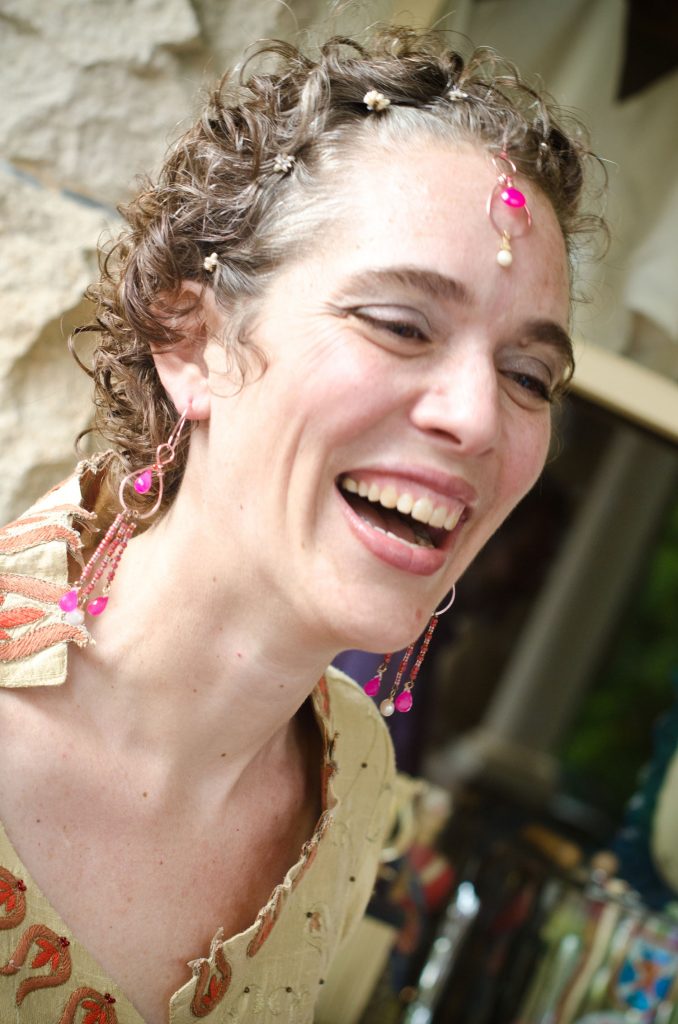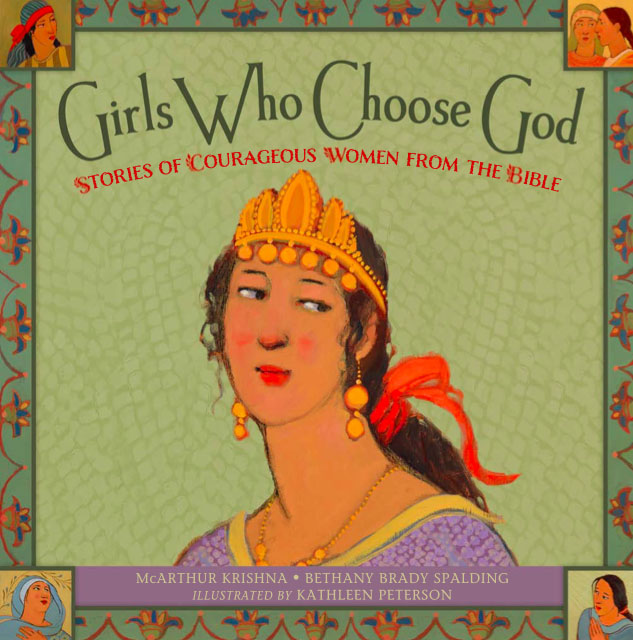McArthur Krishna did not expect to be where she is. And the path she took to get there was an unusual one. McArthur lives in rural India, an overnight train ride from the nearest LDS Church congregation and a world apart from her former life in Washington DC. But her unique experiences have confirmed to her the importance of maintaining her personal relationship with God and trusting in His ways. The result, she says, is an abundant life filled with vibrancy and delight. McArthur is a co-author of the book, Girls Who Choose God: Stories of Courageous Women from the Bible. Writing about women who choose to follow God is one way that McArthur feels actively connected to her faith.
You uprooted from your established life in Washington, DC, to move to India. How did that come about?
A few years ago, I was moving through life. I lived in DC and ran my own company. I was happy. I was working on my profession. I was even going to singles conferences. I was putting in the effort to date but the relationships never felt quite right. And that was okay.
I found that life was abundant. I spent a lot of time traveling and river rafting—two things I love. I had a rich community, a fabulous ward, and close relations with my family. I was loved and needed. Some nephews that lived close were my true loves; I had and have great joy in being an aunt.
My mom actually teased me that I was “too happy”—that I had no motivation to get married. And she was partially right. There was no way I was going to get married to just be married. I had dated some amazing, quality men, and so I had a very high bar for what I knew was possible. People would tell me to not be picky and I would laugh. Because, uh, isn’t your eternal partner the exact thing you should be picky about?
However, I knew I had to be reasonable. A ridiculous list of specific things about hair color and piano player and whatnot seemed to be out of line to me. But I would be selective and choose a partner I could be equally yoked as an eternal companion with. So, I just lived my life with the priorities that I had set and figured if I were happily becoming the best me, then someone would someday be the right fit for that girl.
Then I happened to attend a TED conference in India and met a man who lives in rural India. We spent three hours talking about our philosophies on how to live an abundant life—how to both dig roots to contribute deeply but also have the flexibility to explore the big ol’ grand world God gave us. He was telling me about his village and I got this message from the universe imprinted on my brain like a running marquee, “This is going to be your life.”

Photo by Jed Wells
I don’t often get messages like that from the universe. So I was stunned, and then immediately asked the universe which “this” it was referring to—India? This place? This foundation? This man? There was no follow-up clarification, and so I was left just wondering. But it was clear: the man just didn’t make any sense.
I spent two years thinking that it made no sense. When I relied on my own understanding and logic, it didn’t make sense. His current situation was nothing I would have signed up for. But I prayed about it and knew I was on the right path. I would chicken out and bail on the path and then miracles would bring me back. The most profound spiritual experience I’ve ever had was when I prayed about whether I should marry him. It’s the clearest answer I’ve ever received. Sheer overwhelming light that left me gasping.
Yet, this process and answer felt like a potentially very slippery slope. Dangerous, even. I needed to make sure I could really trust my relationship with God, because I was being told that I should marry someone who was 1) not the person that I was always told I should marry, and 2) under circumstances that seemed insane to an outside observer. It even felt insane to me!
I had some serious blessings along the way in friends and family. In fact, my congregation was incredibly supportive. It is one of the aspects that made this process easier. But then I was visiting a ward and I had one woman in the Church say to me: “That’s fine for you, but I could never settle for a nonmember.” I flinched and the conversation moved on. And then I thought, “Wait! That is not okay to let that perspective stand.”
So I circled back around and explained my philosophy: The goal of life is to become god-like, and the way we do that is by following God. And I absolutely followed God in choosing whom to marry. It was the craziest decision of my life, but it was clear that I did not settle. Following God’s path designed for me is not settling. This is true for me and everyone!
At one point, I was angry with God about all the mess this path involved. I prayed—I am not always very humble in my prayers, but I have always figured God knew I wasn’t feeling humble anyway, so I might as well be authentic—and demanded, “Why did you have to do it this way? I’ve tried to live a good life and here I am in the midst of all this ugliness? Why not just sort all the mess ahead of time and let me marry him with ease?”
What I got back was a very clear feeling of peace and this profound statement: “If I had done it the easy way, you would have just gotten him. The way I’ve done it, you get him and a relationship with me.”
That was a humbling moment. For me that was a huge realization. For two years, when I was trying to figure out how to walk this path with this man, the only way I could keep myself balanced and even-keeled was by relying on God. I was fasting once a week, I was desperate, and I was compelled to be humble. It still made no sense. But God gave me the guts to go through with it.
That has guided so much of my life now. I’ve learned that when you’re faced with something that doesn’t feel fair, it’s an opportunity to choose to strengthen your relationship with God.
And I learned about seeing with God’s view. I was reading a talk by President Monson and he was talking about people making choices. He said when God needed the best missionary effort he didn’t recruit from among his advocates but from his adversaries—and Saul got the opportunity to become Paul. We see the world so much as it is now rather than as God sees: what is possible. For me to walk this path forced me to try to trust God’s vision of what could be, rather than what is.
And, for me, God’s ways are abundant. I thought I had to be reasonable about what I would get in a life partner—and what I got delivered was stunning, jaw-dropping abundance. Not easy, but abundant. He’s amazing!
How do you worship in India? Do you attend a ward or branch?
I live in rural India and there is no congregation nearby. I have to take a plane or overnight train ride to the nearest ward, so if I’m lucky, I attend a ward about once per month. I have no visiting teachers or home teachers or Relief Society.
When my mom came to visit she asked me, “How do you hold onto your God?” For my mom, who grew up in rural Utah where her life revolved around Church structure, she couldn’t fathom it. Initially, I felt a little guilty that my life now doesn’t give me more of the structure that I was raised to participate in. And then I paused and said, “No, mom, that’s the point: I only have God to hold on to. My spiritual life is God. None of the trappings, none of the fluff. I’ve just got God…and the internet.”
Choosing God in the Capitol Hill Ward (in Washington, DC) meant that I was a Seminary teacher and a Young Women’s president and a Gospel Doctrine teacher and a visiting teacher. But those things aren’t options here, so choosing God has to take on a very different format. And that’s okay. It’s a daily choice. Nobody here cares if I say my prayers and read my scriptures and pay my tithing. It is absolutely up to me whether I do those things. What I find is that instead of asking myself if I have done the checklist, I have to ask, “How is my relationship with God?” and then I work on that. And then when I get the gift—yes, gift—of going to Church, then I am deeply appreciative of getting to feast on light with a community.
What is your life like in India? You have left your profession, so what do you focus on now?
In Washington DC your life is defined by what you do. It’s everyone’s first question, and I use to have an easy answer. Now I steal a friend’s term and say I am a “Life Enhancer.” For me, I have had to gain comfort that my worth is not a paycheck or a specific title. I split my time among a lot of roles—I am using the professional skills I’ve developed to help the family businesses, working in a foundation to help village women develop employable skills and revitalize heritage crafts, trying to raise kids, designing/creating, and now writing kids’ books. Oh yeah, and hatching a lot of schemes for sheer delight. Life is very, very busy and almost nothing like my old life—but ridiculously abundant!
In the last while, I’ve really been focused on writing—along with Bethany Brady Spalding—the book Girls Who Choose God and working to get it published and promoted.
What was the catalyst for writing Girls Who Choose God?
Years ago, Bethany’s daughter—then three years old—was reading her cartoon scripture book of prophets, warriors, and heroes and she asked, “Mom, where are the girls?”
Bethany and I talked about this and thought we could write a children’s book that told the stories of the women in the scriptures and in Church history.
We wanted to start the book right away, but Bethany was living in Mumbai and I was living in DC at the time. Then Bethany moved to Chicago and gave birth to another baby. I was transitioning from my job and moving to India. We had trouble fitting a book around all those life events. It took us three years of working on it occasionally. We’d have a meeting every few months to share ideas.
Bethany came up with the concept of basing the book around choice and choosing God. We sent out emails to friends to get their feedback about our ideas. It wasn’t even slow and steady work; it was slow and erratic!
But then Bethany settled in Virginia and I was getting settled in India, so the stars finally aligned in a way that we could move this forward. And then it felt fortuitous, because there’s such a growing fervor right now in the Church around women’s issues.
As Bethany and I started writing the book, I thought, “It’s so interesting that I’m writing this book at a point when I don’t have much Church structure around me.” Working on this book was one way that I could remain connected to my testimony and my beliefs. I needed to be in tune.
It’s so exciting that Deseret Book is publishing Girls Who Choose God. How did that come about?
From the beginning, we wanted Deseret Book to publish it. We wanted the concept of women being spiritual peers to be mainstream. I hope that the audience for the book is girls and boys. We give little girls books about Abraham and Joseph Smith and Nephi and warriors and heroes, so why not give little boys books about women who have made deliberate decisions to follow God?
We had already asked the artist, Kathy Peterson, to be on board with us. She had started painting before we even had a contract, even with no guarantee that she’d get reimbursed. So we approached Deseret Book with Kathy’s painting of Eve in hand.
This is not typically how you do it in publishing. Usually, the publisher assigns you an artist to illustrate. We were able to show them what we envisioned—how beautiful and noble and powerful these women were—and Deseret Book realized there wasn’t anything else like this on the market.
The great reward now is that the LDS Church has acquired eleven of the paintings from the book. They are hanging in the Conference Center for a year. Obviously this has been a great outcome for Kathy’s leap of faith with us!
Originally, we were proposing a single book on women in the scriptures—Bible, Book of Mormon, and Church history all combined—but Deseret Book said they wanted to break it into a series.
So this first book focuses on women in the Bible, right? Are you already working on the next books in the series?
The first book has to be a commercial success in order to continue with the series, so we’re doing everything we can think of to spread the word about the book in the hopes that many people will buy a copy. Or several copies! Or even just spread the word!
We can shamelessly plug for people to buy the book as we are passionate about the cause, of course, but we are also donating all the authors’ proceeds to Interweave Solutions, an NGO that works with LDS women around the world to develop education and entrepreneurial skills. Bethany knows the co-founder and we think our donation will be used as effectively as possible.
But, yes, we are working on both a Book of Mormon and the beginnings of a Church history volume.
As I think about the Book of Mormon, I don’t recall many women. Who will you write about if you get to do this next book in the series?
We used to think there weren’t enough women in the Book of Mormon to fill a book, but when I read and researched the Book of Mormon really thoroughly, specifically looking for women, I found over a hundred instances when women are mentioned—even though they’re not often mentioned by name. Our books—including the current Girls Who Choose God Bible stories—have both named and unnamed women. Even if women aren’t named, it’s important to understand that they were active participants.
For example, in the Book of Mormon, there were women being baptized at the Waters of Mormon and pitching their tent to listen to King Benjamin speak. There are the mothers of the Stripling Warriors, and the Nephite daughters who pled with the Lamanites for the lives of their families. There are so many women who are active participants in their faith.
The whole process of writing this book has reinforced what my life has taught me in the last few years: that there are numerous ways to choose God. How you do it is not that important—in terms of location, occupation, marital status, et cetera. There is not a cookie-cutter shape to how we should each choose God in our own lives. It can be a vibrant kaleidoscope of solid options.
But making that choice—choosing God—is vital. For me, I am clear that the wild ride I am on is God’s path. And it is both much more abundant and insane than I ever imagined.
At A Glance
McArthur Krishna

Location: Faizabad, India
Age: 40
Marital status: Married
Children: 2+
Occupation: Life Enhancer
Schools Attended: Brigham Young University (twice around!)
Languages Spoken at Home: Hindi, English, and trash talk
Favorite Hymn: “How Great Thou Art”
On The Web: Girls Who Choose God and McArthurKrishna.com
Interview by Barbara Christiansen. Photos used with permission.
At A Glance



